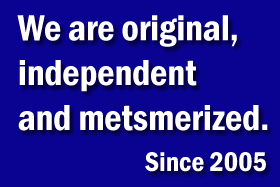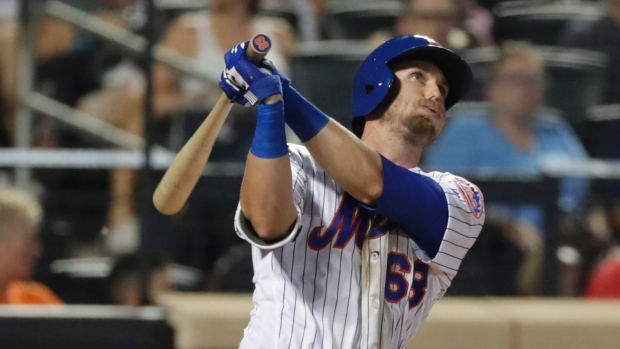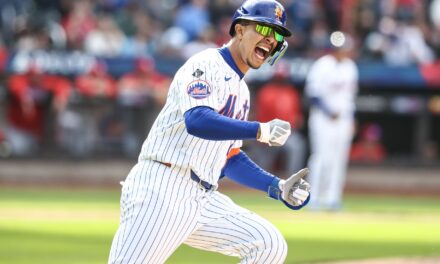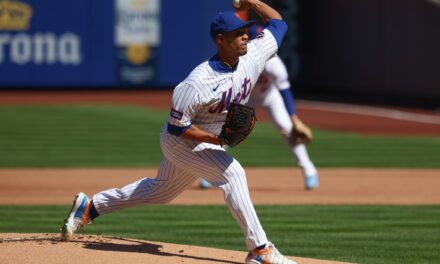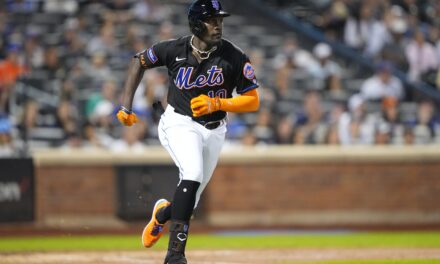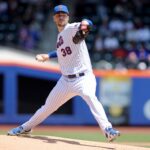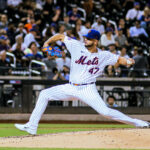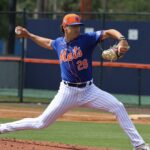
Jeff McNeil, 2B
Player Data: Age: 26, B/T: L/R
Primary Stats: 63 G, 248 PA, 3 HR, 19 RBI, .329/.381/.471
Advanced Stats: 137 wRC+, .368 wOBA, 5.6% BB, 9.7% K, 2.7 fWAR/2.4 bWAR
Free agency: 2025
2019 Salary: Pre-arbitration
Grade: A
2018 Review
If there is one hitter who best characterized the Mets’ revitalized second half, it has to be Jeff McNeil. Making his big-league debut as a pinch-hitter on July 24 and filling Asdrubal Cabrera‘s shoes at second base just one week and one deadline trade later, the 2013 12th-rounder turned in two months of exciting, scrappy, and above all else, consistent at-bats.
McNeil’s .795 OPS with two strikes, .812 OPS against lefties, and .959 OPS at home all led a club that, prior to his arrival, had ranked 22nd, last, and again last in the majors, respectively, and subsequently went 31-22 in games he started. One could make the argument that his contributions out of the two-hole are owed to Amed Rosario‘s own breakthrough in the leadoff spot, which, in its own right, set up its share of scoring opportunities. Even so, McNeil slashed .323/.367/.485 with the bases empty, with his 136 wRC+ ranking 32nd in the majors – ahead of such names as Jose Altuve, Nolan Arenado, and Khris Davis. His .351 average against the shift came in a tad lower at 43rd, but leaves quite an impression nonetheless.
One hitch in McNeil’s game that could raise flags next season was his struggles against the fastball, as power pitchers held him to a weaker line of .229/.315/.271 while striking him out 12 times in 55 plate appearances. His output against fastballs declined toward the end of the year, as his 2.2 runs above average on heaters through August dropped by -1.5 in the last month of the season, with most of his struggles coming along the inner part of the plate.
On defense, McNeil held up relatively well. He committed just two errors while turning 24 double plays in over 460 innings at second base, though his range lacked at times, as his -0.8 range runs above average can attest. Luckily, his value as a baserunner was much higher, as he stole seven bags in just eight attempts while taking 59% of extra bases. Make no mistake, the Long Beach product contributed well beyond putting the ball in play.
2019 Outlook
Team general manager Brodie Van Wagenen told reporters earlier in the month that McNeil has been penciled in” as next year’s starting second baseman. Even as roleplayers like Gavin Cecchini and T.J. Rivera make their way back into the conversation this spring, there’s essentially nothing standing in McNeil’s way. The lone question that fans and writers alike will bring into the 2019 season is whether or not McNeil’s productivity will hold up over the course of a 162-game season.
Considering he owns a career .311/.380/.443 figure across six minor league seasons, it’s difficult to see an inside fastball being his undoing. A natural ability to make contact is a gift of McNeil’s that past flash like Mike Vail and Ike Davis were never as fortunate to have had, even in their more successful early years. Alex Ochoa and Gregg Jefferies‘ respective struggles following their hot starts are a bit more feasible of comparisons, but for every Ochoa and Jefferies, there’s been a Hubie Brooks and Daniel Murphy.
Some regression to the mean should be anticipated, but given the names he’s put himself beside in his first two months, it’s hard to be pessimistic: McNeil’s .852 OPS in 2018 was the third-highest among Met rookies – coming in behind Benny Agbayani‘s .888 in 1999 and David Wright‘s .857 in 2004. Through his first 57 games, McNeil put together a 2.5 fWAR. Yoenis Cespedes put up a 2.6 through his 56 games after the Mets first acquired him in 2015. Put another way, the Mets may have a jewel on their hands.
